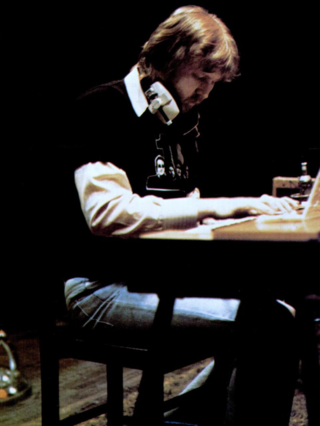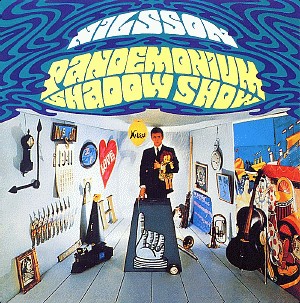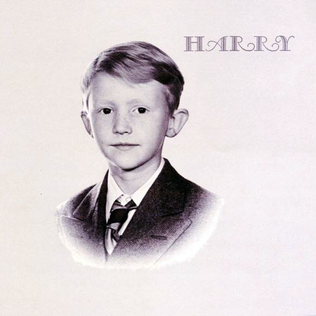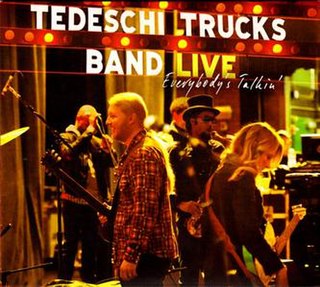
Harry Edward Nilsson III, sometimes credited as Nilsson, was an American singer-songwriter who reached the peak of his success in the early 1970s. His work is characterized by pioneering vocal overdub experiments, a return to the Great American Songbook, and fusions of Caribbean sounds. Nilsson was one of the few major pop-rock recording artists to achieve significant commercial success without performing major public concerts or touring regularly.
The 12th Annual Grammy Awards were held on March 11, 1970. They recognized accomplishments of musicians for the year 1969.
"Without You" is a song written by Pete Ham and Tom Evans of British rock group Badfinger, and first released on their 1970 album No Dice. The power ballad has been recorded by over 180 artists, and versions released as singles by Harry Nilsson (1971) and Mariah Carey (1994) became international number one hits. The Nilsson version was included in 2021's Rolling Stone's 500 Greatest Songs of All Time. Paul McCartney once described it as "the killer song of all time".

Aerial Ballet is the third studio album by American musician Harry Nilsson, released in July 1968.

Pandemonium Shadow Show is the second studio album by American singer-songwriter Harry Nilsson, released in December 1967 on RCA Victor.

Harry is the fourth studio album by Harry Nilsson, released August 1969 on RCA. It was his first album to get onto Billboard Magazine's Billboard 200 chart, remaining there for 15 weeks and reaching #120.

Nilsson Sings Newman is the fifth studio album by American singer-songwriter Harry Nilsson, released in February 1970 on RCA Victor. It features songs written by Randy Newman. Recorded over six weeks in late 1969, the album showcases Nilsson's voice multi-tracked in layers of tone and harmony. Its arrangements are otherwise sparse, with most of the instrumentation provided by Newman on piano. The record was not a great commercial success, but won a 1970 "Record of the Year" award from Stereo Review magazine. The LP record cover art was illustrated by Dean Torrence.

A remix album is an album consisting of remixes or rerecorded versions of an artist's earlier released material. The first act who employed the format was American singer-songwriter Harry Nilsson. As of 2007, the best-selling remix album of all time is Michael Jackson's Blood on the Dance Floor: HIStory in the Mix (1997).

Mocean Worker is the recording alias of jazz musician and producer Adam Dorn.

Fred Neil is the second album from Fred Neil, a pioneer folk rock musician, recorded and released in 1966. The album has a more laid-back sound than his debut, and contains his best-known songs; "Everybody's Talkin'" and "The Dolphins". It was re-released in 1969 under the title Everybody's Talkin' in response to the international success of the soundtrack of the movie Midnight Cowboy, which made a hit of the new title track for Harry Nilsson. Music journalist Richie Unterberger characterizes the album as Neil's best, and it was listed in the first (2005) edition of the book 1001 Albums You Must Hear Before You Die, edited by Robert Dimery.

Meet Me in Margaritaville: The Ultimate Collection is a Jimmy Buffett greatest hits compilation album consisting of 2 compact discs and 38 songs. The album is notable for several newly recorded and updated versions of songs considered as classics in his repertoire. It includes every track from Songs You Know By Heart except for "Boat Drinks".

"Everybody's Talkin' (Echoes)" is a song written and recorded by the American singer-songwriter Fred Neil in 1966 and released two years later. A version of the song performed by the American singer-songwriter Harry Nilsson became a hit in 1969, reaching No. 6 on the Billboard Hot 100 chart and winning a Grammy Award after it was featured in the film Midnight Cowboy. The song, which describes the singer's desire to retreat from the harshness of the city to a more peaceful place and an easier life, is among the most famous works of both artists, and has been covered by many other notable performers.

Glenn K. Bolton, widely known as Daddy-O, is an American rapper and record producer. He began his career by founding the hip-hop group Stetsasonic. He is known as an early advocate of sampling in music.

"One" is a song by American singer-songwriter Harry Nilsson from his 1968 album Aerial Ballet. It is known for its opening line "One is the loneliest number that you'll ever do". Nilsson wrote the song after calling someone and getting a busy signal. He stayed on the line listening to the "beep, beep, beep, beep..." tone, writing the song. The busy signal became the opening notes.

Duke Pandemonium is the second studio album by Scottish conceptual rock duo Marmaduke Duke, released on 11 May 2009 on 14th Floor Records. Band member JP Reid describes the album as "superfunky, supertight, superunique."
The Cowboy Bebop anime series was accompanied by a number of soundtrack albums composed by Yoko Kanno and Seatbelts, a diverse band Kanno formed to create the music for the series, with a principal focus in jazz. The soundtrack was released in the American market by Victor Entertainment, a subsidiary of JVC Kenwood.

Raindrops Keep Fallin' on My Head is an album by American pop singer Johnny Mathis that was released on February 25, 1970, by Columbia Records and included several covers of chart hits from the previous year along with 1964's "Watch What Happens" and the 1966 tunes "Alfie" and "A Man and a Woman".

Everybody's Talkin' is the second album and the first live album by the 11-piece Tedeschi Trucks Band and was released in 2012 by Sony Masterworks. It's been released as a 2-CD and 3-CD set as well as a three disc vinyl set. The title comes from the song carrying the same name, formerly a hit for Harry Nilsson. The band's cover is a hybrid of the Nilsson and Bill Withers versions.
"All for the Beatles" is a song written and released in 1964 by Harry Nilsson and John Marascalco. It was released as a single with the alternative title "Stand Up and Holler" under Nilsson's pseudonym Foto-Fi Four and was packaged with a synchronized standard 8 mm film of The Beatles first arriving in the United States in 1964.

"Gotta Get Up" is a song written by American singer-songwriter Harry Nilsson and the opening track from his 1971 album Nilsson Schmilsson. It was first released as the B-side to his single "Without You". "Gotta Get Up" is an upbeat pop song with a music hall feeling and lyrics about transitioning from carefree youth to adult responsibility. Nilsson based the lyrics on his experiences working at a bank and on his parents.
















